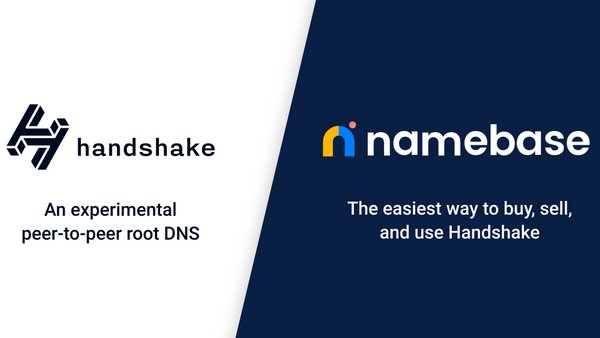Imagine owning a domain that cannot easily be shut down by the government? Having complete control over emails, browsers, social media, and mobile phones without anyone being able to have access to our private data? That’s what Handshake hopes to do.
Handshake is a new naming protocol that’s backwards compatible with the existing DNS. It does not replace the DNS protocol, but it replaces the root zone file (where TLD ownership is stored) and the root servers with a blockchain-based system that anyone can use. This allows the root zone to be uncensorable, permissionless and free of gatekeepers like the ICANN which manages the root zone today.
A quick background. DNS or Domain Name System (DNS) is a decentralised naming system for computers, services, or other resources connected to the Internet or a private network. DNS has been an essential component of the functionality of the Internet since 1985. It hasn’t changed much since to address threats to freedom and safety on the Internet.
In the current DNS hierarchy, at the top is the root zone which is managed by the ICANN (The Internet Corporation for Assigned Names and Numbers, an American nonprofit organisation responsible for coordinating the maintenance and procedures of several databases related to the namespaces and numerical), which determines who gets what TLD or top-level domain.
TLDs are installed in the root zone of the name space. ICANN, the centralised entity that manages the root zone today, determines what top-level domains (TLDs) — like .com, .net, .org — are allowed. ICANN requires a $185,000 USD application fee to request a new TLD, and applications for new TLDs are currently closed.This artificially limits the availability of good domains for website owners and developers.
The current centralised nature of internet names results in a potential loss of privacy and censorship. Even if your domain registrar offers WHOIS protections, your information can still be subpoenaed from a domain registrar. Governments and ISPs commonly use DNS filtering and redirection to censor domains. ISPs on the other hand often monetise personal DNS data by selling your web browsing history.
Handshake on the other hand is a new naming protocol that’s backwards compatible with the existing DNS. It does not replace the DNS protocol, but it replaces the root zone file (where TLD ownership is stored) and the root servers with a blockchain-based system that anyone can use. This allows the root zone to be uncensorable, permissionless, and free of gatekeepers like the ICANN which manages the root zone today.
Every peer in the network cryptographically validates and manages the root zone, which also removes the need for the Certificate Authority system (CAs) entirely.
Names are logged on the Handshake blockchain — essentially one big distributed zone file that anyone has the right to add an entry in.
Existing TLDs will be blacklisted from being registered on the network and Handshake resolvers will use traditional TLDs as the source of truth when you visit a traditional domain like namebase.io. Naturally, the Handshake resolvers will use the Handshake blockchain as the source of truth when you visit a Handshake domain like namebase/.
Handshake domains are Top-Level Domains that anyone can register, not just ICANN. They can be used like a traditional TLD — i.e satoshi.nakamoto/ — or by themselves — i.e satoshi/ — as a standalone name.
Handshake ensures DNS records can only be modified by a domain’s owner. This ensures Handshake domains can’t be censored or maliciously redirected. Registering a Handshake domain respects the privacy of the owner by requiring no personal data during registration.
It’s no wonder Handhake is gaining traction now.


